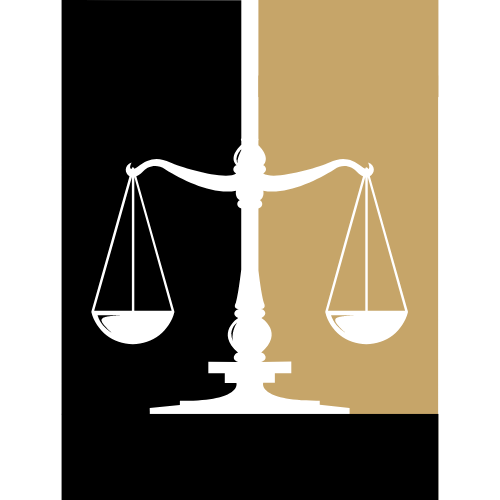Did you know over 10 million criminal charges are filed in the U.S. each year? Understanding criminal charges can be difficult, as the criminal justice system is complex. This guide will help you navigate these challenges, protecting your rights and aiming for the best outcome.
Key Takeaways
- Gain a comprehensive understanding of the criminal justice system and the various types of criminal charges.
- Explore the differences between felony and misdemeanor charges, and their respective consequences.
- Discover effective legal defense strategies and the importance of experienced legal representation.
- Understand the court proceedings and trial processes, as well as sentencing guidelines and mitigating factors.
- Learn about your rights as the accused and the process of expunging or sealing criminal records.
Understanding the Criminal Justice System
The criminal justice system is a complex network of institutions and processes. It is designed to uphold the law and maintain public safety. At its core, it includes the investigation, prosecution, and adjudication of criminal offenses.
This system involves the collaboration of various key stakeholders. Each has a distinct role to play in ensuring justice is fair and effective.
Overview of the Criminal Justice Process
The criminal justice process starts with law enforcement investigating a suspected crime. Once the investigation is complete, the case goes to the prosecutor’s office. There, the decision is made whether to file criminal charges.
If charges are filed, the accused is arraigned. The legal proceedings then move forward, potentially leading to a trial. The trial ends with a verdict and sentencing.
Roles of Key Stakeholders
- Law Enforcement: Law enforcement investigates criminal activities, gathers evidence, and apprehends suspects.
- Prosecutors: Prosecutors evaluate evidence, determine charges, and present the case in court.
- Defense Attorneys: Defense attorneys protect the rights of the accused and advocate for their clients’ interests.
- Judiciary: Judges and juries are impartial decision-makers. They ensure a fair trial and render verdicts based on evidence.
Understanding the criminal justice system and its stakeholders helps us appreciate its complexities. It shows how each part works together to administer justice.
“The criminal justice system is the set of agencies and processes established by governments to control crime and impose penalties on those who violate laws.”
Types of Criminal Charges
In the United States, the criminal justice system divides crimes into two main groups: felonies and misdemeanors. It’s key to know the difference. This is because it affects the penalties and outcomes for the accused.
Felony charges are more serious. They often involve crimes like murder, robbery, and arson. These can lead to long prison sentences and heavy fines.
Misdemeanor charges are less severe. They might include fines, probation, or short jail times. Examples are petty theft, simple assault, and disorderly conduct.
| Felony Charges | Misdemeanor Charges |
|---|---|
| – Murder – Robbery – Aggravated Assault – Grand Theft – Arson |
– Petty Theft – Simple Assault – Disorderly Conduct – Possession of Small Amounts of Controlled Substances |
Remember, the types of charges and their penalties can differ by state. If you’re facing charges, talk to a skilled lawyer. They can help you understand your rights and options.
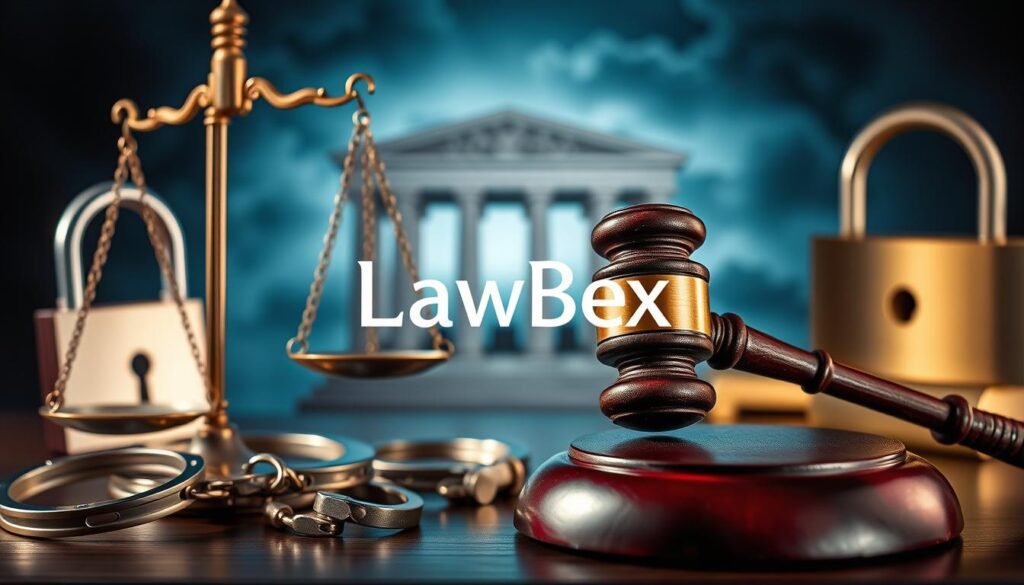
“Understanding the types of criminal charges is the first step in navigating the complex legal system. Knowing the potential consequences can help individuals make informed decisions and seek the appropriate legal representation.”
Felony Charges and Their Consequences
Dealing with felony charges can be very tough. Felonies are the most serious crimes. They can change a person’s life a lot. It’s important to know about felony offenses and their effects to protect your rights.
Defining Felony Offenses
Felonies are crimes that can get you a year or more in jail. They include violent crimes like assault and white-collar crimes like fraud. What makes a crime a felony varies by place, but it usually depends on how serious it is and the harm it can cause.
Penalties and Sentencing Guidelines
Being convicted of a felony can lead to long prison sentences and big fines. You’ll also have a criminal record forever. The length of your sentence depends on the crime, your past crimes, and other factors. In some cases, you might lose rights like voting or owning a gun.
“The consequences of a felony conviction can have a lasting impact on an individual’s life, making it crucial to understand the legal implications and seek the guidance of an experienced criminal defense attorney.”
Understanding felony charges and their effects is key. Knowing the law and possible outcomes helps you make smart choices. This way, you can protect your rights and interests.
Misdemeanor Charges: A Closer Look
Misdemeanor charges are less severe than felonies but still serious. We will explore misdemeanor offenses, their characteristics, and penalties.
Misdemeanor charges are criminal offenses that are less serious than felonies. They can include minor infractions like traffic violations or more serious offenses like petty theft or disorderly conduct.
The main difference between misdemeanors and felonies is the punishment. Misdemeanors usually result in fines, probation, or short jail time. Felonies can lead to long prison sentences and harsher penalties.
Even a minor misdemeanor charge can affect a person’s future. Misdemeanor charges can impact employment, housing, and professional licenses.
| Misdemeanor Offense | Typical Penalty |
|---|---|
| Simple Assault | Up to 1 year in jail, $1,000 fine |
| Petty Theft (under $1,000) | Up to 1 year in jail, $1,000 fine |
| Driving Under the Influence (first offense) | Up to 1 year in jail, $1,000 fine, license suspension |
| Possession of Small Amount of Marijuana | Up to 1 year in jail, $1,000 fine |
Even though some offenses are classified as misdemeanors, the consequences can be severe. It’s important to get help from a skilled criminal defense attorney. They can help navigate the complexities of misdemeanor charges and work towards the best outcome.
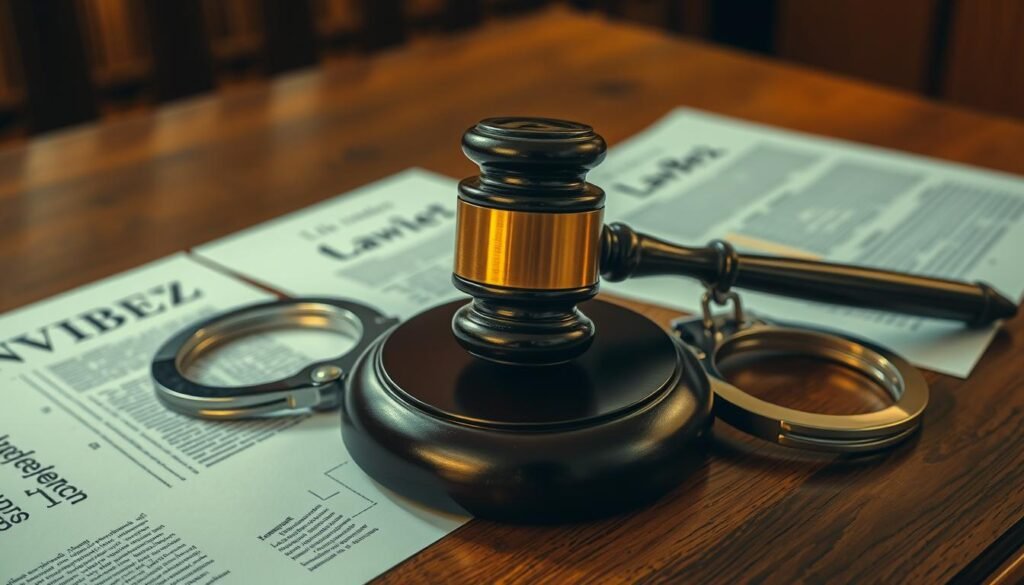
“Even a minor misdemeanor conviction can have a lasting impact on an individual’s life. It is essential to take these charges seriously and seek proper legal representation.”
Understanding criminal charges: Navigating the Legal Landscape
Criminal charges can be very different in what they are and how serious they are. It’s key to know these differences to understand the legal system. Let’s look at some common charges and what makes a charge more serious.
Common Criminal Charges Explained
Some of the most common common criminal charges include assault, theft, drug crimes, and white-collar crimes. Assault can be anything from a simple push to a serious attack, based on the harm done. Theft charges can be from small thefts to big ones like stealing cars, based on the item’s value.
Drug crimes, like having, selling, or making drugs, have different penalties based on the drug and how much there is. White-collar crimes, like fraud and embezzlement, are about making money illegally and can lead to big fines and long prison times. These crimes are complex and need special legal help.
Factors Influencing Charge Severity
Many things can make a charge more serious. The details of the case, like what happened and how bad it was, matter a lot. Also, if someone has been in trouble before can affect the charges they face.
Where the charges are filed also matters. Laws and how cases are handled can differ a lot from place to place. This can lead to different charges and penalties for the same crime.
It’s important to understand the details of criminal charges and what makes them more serious. Knowing this helps people facing charges to protect their rights and get the best outcome. Getting advice from experienced lawyers is key.
Building a Strong Legal Defense
Going through the criminal justice system can be tough. That’s why having a good lawyer is key. An experienced criminal defense attorney can greatly improve your case’s outcome.
Importance of Experienced Legal Representation
Criminal defense lawyers know the law well. They can look at the evidence, challenge the prosecution, and protect your rights. They use their knowledge to find the best defense for you.
Strategies for Effective Criminal Defense
- Evidence Examination: Good lawyers check the evidence against you. They find any weak points that could hurt the prosecution’s case.
- Plea Bargaining: Your lawyer might talk to the prosecution. They could get you a better deal, like lighter charges or penalties.
- Mitigating Factors: Your lawyer will highlight any factors that could help you. This could be your personal situation, mental health, or past actions.
With a skilled criminal defense attorney, you have a better chance of a good outcome. They protect your rights and fight for you in court. Remember, having a good lawyer is crucial for a strong defense.
“A good defense attorney can make all the difference in the world. They have the knowledge, experience, and strategies to navigate the complexities of the criminal justice system and fight for your rights.”
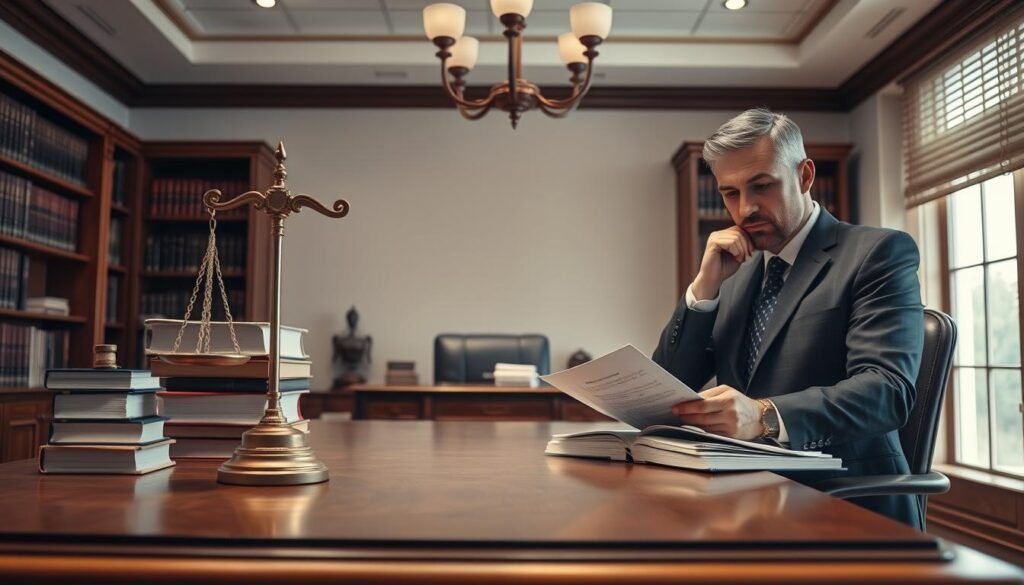
Court Proceedings and Trial Processes
When criminal charges are filed, the court journey starts. This stage includes many important steps that decide the case’s outcome. We’ll look at the main parts that shape this legal world.
The first step is the arraignment. Here, the accused learns about the charges and can choose a plea. Then, pre-trial hearings happen. These talks between the judge and lawyers set the trial’s rules.
- Jury selection is key. It makes sure the jury is fair and impartial.
- At the trial, both sides present their cases. They call witnesses and show evidence.
- The judge is very important. They manage the trial, make legal decisions, and guide the jury.
The trial ends with the jury deciding. If they find someone guilty, the judge then decides the punishment. This depends on the crime’s severity and other factors.
“The ultimate measure of a trial is its fairness, not its outcome.” – Thurgood Marshall
Knowing about court proceedings and trial processes is key. It helps us understand the criminal justice system better. By learning about these steps, we can see how fair and just the system tries to be.
Sentencing Guidelines and Mitigating Factors
When a defendant is found guilty, the court decides the right sentence. This is based on sentencing guidelines. These guidelines outline sentencing options like jail time, probation, and fines. The harshness of the sentence can change based on mitigating circumstances.
Understanding Sentencing Options
The guidelines help the court decide the right punishment for a crime. They look at the seriousness of the crime, the defendant’s criminal history, and how it affected the victim. Sentences can be anything from probation to lengthy prison terms, based on the crime’s severity and the defendant’s situation.
Mitigating Circumstances and Plea Bargaining
In some cases, the court might look at mitigating circumstances to lessen the sentence. These can include the defendant’s personal history, mental health, or cooperation with the authorities. Plea bargaining also plays a part, where the defendant pleads guilty for a lighter sentence or charge.
| Sentencing Option | Description |
|---|---|
| Incarceration | A term of imprisonment, ranging from a few months to several years, depending on the severity of the crime. |
| Probation | A sentence that allows the defendant to remain in the community under the supervision of a probation officer, with specific conditions that must be met. |
| Fines | Monetary penalties imposed by the court, which can range from a few hundred dollars to hundreds of thousands, depending on the offense. |
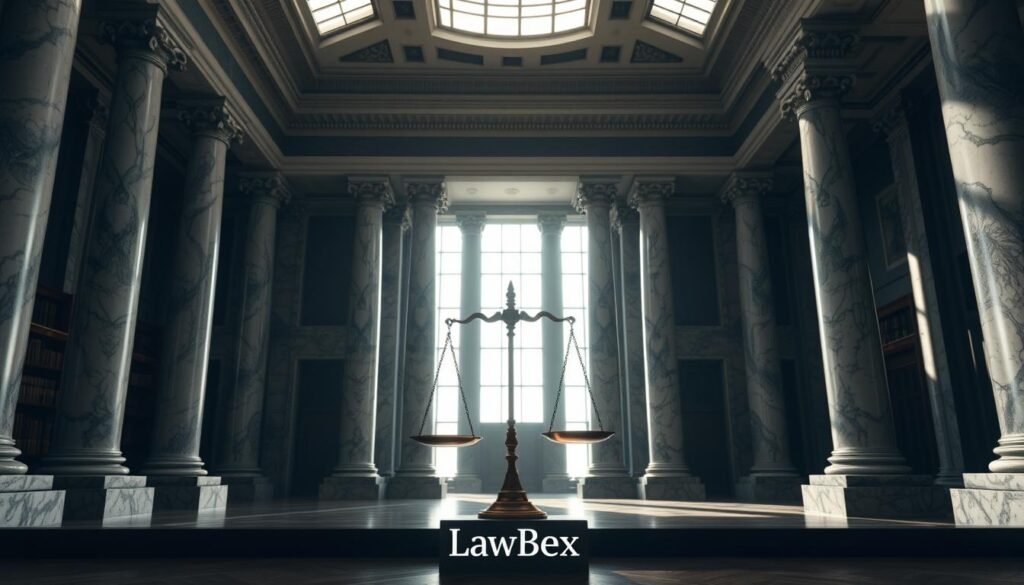
“The sentencing guidelines serve as a vital tool for ensuring consistent and fair punishment for federal crimes, while also allowing for flexibility to account for individual circumstances.”
Expungement and Sealing of Criminal Records
In some cases, people can have their criminal records expunged or sealed. This helps them start fresh and reduces the impact of a conviction. Expungement means the court removes the record from public view. On the other hand, record sealing limits who can see the record, but it’s not erased.
Who can get their records expunged or sealed depends on where they live and the crime they were charged with. Usually, those who were not convicted or have served their sentence and stayed clean for a while can apply.
- It’s key to know the expungement and record sealing laws in your area, as they can vary a lot.
- Getting advice from a lawyer is often a good idea. They can help you understand the process and make sure you follow the rules.
- The steps to seal or expunge a record might include filing a petition, providing documents, and going to court.
Dealing with the effects of a criminal record can be tough but vital. Learning about expungement and record sealing can help people take back control of their lives. It can also help them overcome the obstacles a criminal record can bring.
“Sealing or expunging a criminal record can be a transformative step, allowing individuals to move forward and pursue their goals without the burden of a past mistake.”
Protecting Your Rights as the Accused
Throughout the criminal justice process, people have certain constitutional safeguards and due process rights. These rights, like the presumption of innocence and the right against self-incrimination, are key. They help make sure the process is fair and just.
Navigating Constitutional Safeguards
The rights of the accused are found in the U.S. Constitution. They protect people from government abuse. These rights include a speedy and public trial, an impartial jury, and the chance to face and question witnesses.
Avoiding Self-Incrimination and Preserving Evidence
The right against self-incrimination is a vital constitutional safeguard. People should be careful about talking to police without a lawyer. Anything said could be used against them. It’s also important to keep any evidence that could help their defense.
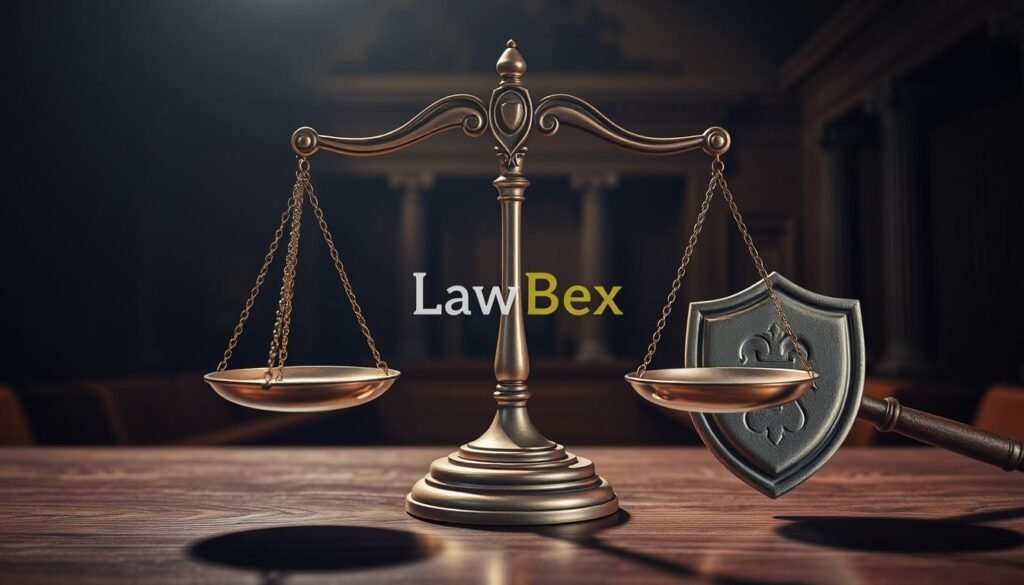
By knowing and using these constitutional rights, people can help make sure the criminal justice system is fair. This protects their rights as the accused.
Navigating the Appeals Process
When someone is found guilty of a crime, they might appeal the decision. The appeals process is key in the criminal justice system. It lets defendants challenge their verdict or sentence.
Appeals can be based on legal mistakes or procedural issues during the trial. This might include wrong evidence, bad jury instructions, or poor legal help. A panel of judges will look at the case and arguments from both sides.
- Timely Filing: Defendants must file their appeal within a specific timeframe, often 30 days, to ensure their case is considered.
- Appellate Review: The appeals court will review the lower court’s decision, examining whether any legal errors were made that may have affected the outcome.
- Potential Outcomes: The appeals court may uphold the original conviction, order a retrial, or even overturn the conviction entirely, leading to a reduced sentence or dismissal of charges.
The appeals process is complex and important. It’s vital for defendants to have good legal help. By knowing their rights and the process, those found guilty can try to get a better outcome.
“The right to appeal a criminal conviction is a fundamental component of our justice system, ensuring that individuals have a fair opportunity to challenge the validity of their conviction.”
NAVIGATING THE CRIMINAL JUSTICE SYSTEM: EXPERT GUIDE
Conclusion: Seeking Professional Legal Assistance
Seeking professional legal help is crucial when facing criminal charges. An experienced criminal defense attorney can guide you, protect your rights, and plan a strategy for the best outcome. They know the legal system well.
We urge our readers to talk to a qualified lawyer to make sure their rights are looked after. A skilled attorney can handle the legal process, look at all options, and fight for your best interest. This can lead to a favorable outcome.
Your rights and future are at risk with criminal charges. Getting advice from a seasoned criminal defense lawyer is a smart move. It helps protect your interests and aims for the best result. Don’t wait to find the legal help you need now.
